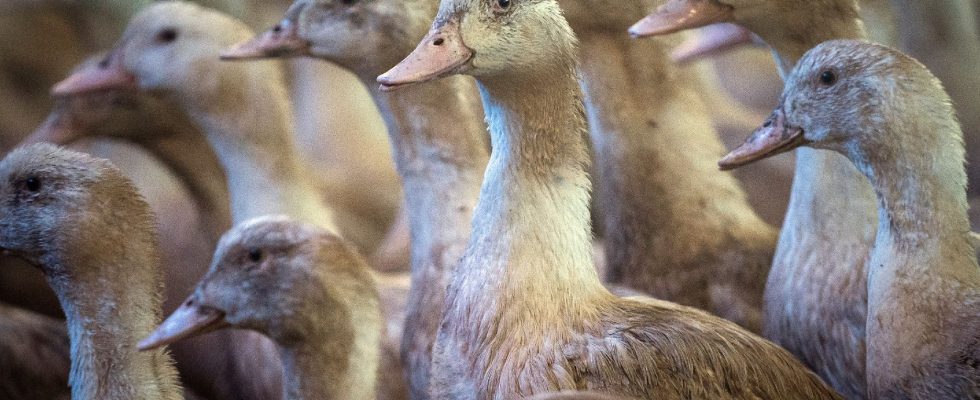Hope in the fight against bird flu: ducks could soon have their vaccine, according to the results of two trials made in France carried out in Côtes-d’Armor, in partnership with ANSES (National Agency for Food, Environmental and Occupational Health Safety). Are we heading towards the end of (regular) mass slaughter to avoid the risk of the virus being transmitted to humans? “In any case, this is very encouraging news,” says Jean-Luc Guérin, laboratory director at INRAE and co-responsible for the study for the National Veterinary School of Toulouse.
L’Express: According to ANSES, vaccinated ducks are protected and hardly transmit the virus. What is the significance of these results?
Jean-Luc Guerin: For months, the bird flu virus has been decimating European farms. More than 20 million poultry were slaughtered last year, and already six million since this year. We did not have effective vaccines against this virus in ducks. The published results are therefore very encouraging. They show that we have not one, but two vaccines that can protect animals against the disease and above all block the infection. Vaccinated ducks hardly transmit the flu, which stops the circulation of the virus across a herd. In other words: vaccines block epidemic dynamics under the conditions in which they were tested.
You seem more concerned with blocking the circulation of the virus than protecting the ducks…
Both are important. But it is true that the capacity of the vaccine to reduce the circulation of the virus is a decisive criterion. Otherwise, the vaccine is a false friend. It protects the animals, of course, but at the same time it masks the symptoms of the disease. The virus can therefore protect itself quietly, mutate, and ultimately risks becoming contaminating for humans, causing an epidemic and claiming many victims. This is precisely what we are trying to avoid with the health restrictions put in place in the herds! Thus, some countries were afraid that the vaccine would not be effective and that the virus would still circulate. This study provides reassuring elements, and in favor of vaccination.
So it’s a small revolution?
Somehow. Until now, the international veterinary community considered that it was more effective to depopulate infected farms than to vaccinate, due to the low effectiveness of vaccines against transmission of the virus. Even after the vaccination, we had to massively test the animals. Sticking swabs into ducks is tedious. And repeated on the scale of France or Europe, it is expensive! Especially since the virus that is currently circulating is so contagious that our rules were exceeded.
The Ministry of Agriculture wants to vaccinate this fall. So is this the end of killings and restrictive safety rules?
We are not going to stop these procedures immediately, but the vaccines could be a good complement and reduce the number of slaughters. In reality, France cannot decide to vaccinate alone: there are European rules. We also have to teach and convince countries that are more skeptical, tell them that the vaccine works and that they must not close their borders to our products. Ensuring these criteria will take time.
The vaccines tested in France do not work on all poultry species. Is it still useful?
Yes, ducks are the priority target! They are the most susceptible to the virus, and they will produce the most virus particles when they get sick. In France, we have a lot of ducks: it’s lucky from a gastronomic point of view, but from a biological point of view it’s the most complicated thing for breeders. Chickens are less susceptible and spread the bird virus less.
Some consumers still worry that vaccines will tamper with products. How to reassure them?
Pigs, cattle, chickens, all the animals we eat are vaccinated! In the trial that was done, we searched for evidence of vaccine-associated lesions and were unable to find anything. When the animals are eaten, it elapses several months after the injections. The risk of finding traces is therefore minimal. In any case, vaccination presents no danger, even for humans. And it doesn’t change the taste!
